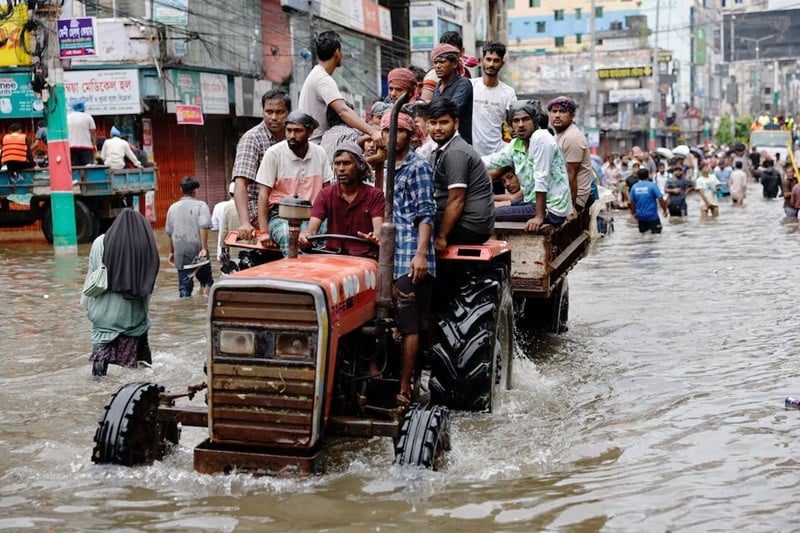Floodwaters inundate Bangladesh; urgent need for food, water, and medical aid grows

DHAKA: At least 20 people have lost their lives, and more than 5.2 million have been affected by devastating floods in Bangladesh, as relentless monsoon rains and overflowing rivers continue to wreak havoc across the country. The flooding has left many people isolated, with urgent needs for food, clean water, medicine, and dry clothing, particularly in remote areas where blocked roads have hindered rescue and relief efforts.
Government Chief Adviser Mohammad Yunus, in a televised address, assured the nation that the administration has taken all necessary measures to ensure a swift return to normalcy for flood victims. Yunus, a Nobel Peace Prize laureate, is leading the interim government that took charge following the recent student-led uprising, which led to former Prime Minister Sheikh Hasina fleeing the country.
The situation on the ground remains dire, as residents in affected areas struggle to cope with the disaster. Abdul Halim, a 65-year-old farmer from the Comilla district, recounted the terrifying moment when his mud hut was swept away by a 10-foot-high surge of floodwater in the middle of the night. “There are no goods and no water. Barely anyone has come with the relief (aid) deep inside the villages. You have to physically go close to the main road to collect it,” he told Reuters television.
The flooding has sparked allegations that it was caused by the opening of dam sluice gates in neighboring India, a claim that New Delhi has denied. In response, Yunus mentioned that discussions with neighboring countries have begun to prevent future flood situations.
The Bangladesh Meteorological Department has warned that the flood conditions could persist if the monsoon rains continue, as water levels are receding very slowly. Currently, more than 400,000 people have taken refuge in approximately 3,500 shelters across the 11 flood-hit districts. Nearly 750 medical teams are on the ground providing treatment, with the army, air force, navy, and Border Guard Bangladesh assisting in rescue operations.
The flooding underscores the vulnerability of Bangladesh, one of the world’s most climate-sensitive countries. A 2015 analysis by the World Bank Institute estimated that 3.5 million people in Bangladesh were at risk of annual river flooding. Scientists have attributed the increasing severity of such catastrophic events to climate change.
Kabita Bose, Country Director of Plan International Bangladesh, highlighted the widespread and devastating impact of this year’s monsoon rains. “Entire communities have been completely inundated, and there are now millions of people, including children, in need of safe shelter and lifesaving humanitarian assistance,” she said, underscoring the urgent need for continued support and intervention in the face of this growing humanitarian crisis.
- #BangladeshFloods,
- #FloodRelief,
- #DisasterResponse,
- #HumanitarianAid,
- #ClimateCrisis,
- #BangladeshFloodRelief,
- #MonsoonDisaster,
- #EmergencyAid,
- #BangladeshCrisis,
- #FloodImpact,



